Auditing Practices: Ethical Standards and Audit Reporting Analysis
VerifiedAdded on 2020/05/28
|8
|2041
|154
Homework Assignment
AI Summary
This assignment on auditing practices examines various ethical scenarios based on APES 110, addressing confidentiality, independence, and conflicts of interest. It analyzes several case studies, evaluating whether ethical standards have been breached and providing justifications. The assignment also explores different types of audit opinions, including unqualified, qualified, and adverse opinions, based on specific situations like limitations in audit scope, misstatements, and non-compliance with auditing standards. Furthermore, it considers the implications of going concern issues and the impact of management's actions on the auditor's report. The assignment provides a comprehensive understanding of audit reporting and ethical considerations in the field of auditing. The assignment also covers aspects of audit reporting, including the impact of internal control weaknesses, and the implications of non-compliance with accounting standards.
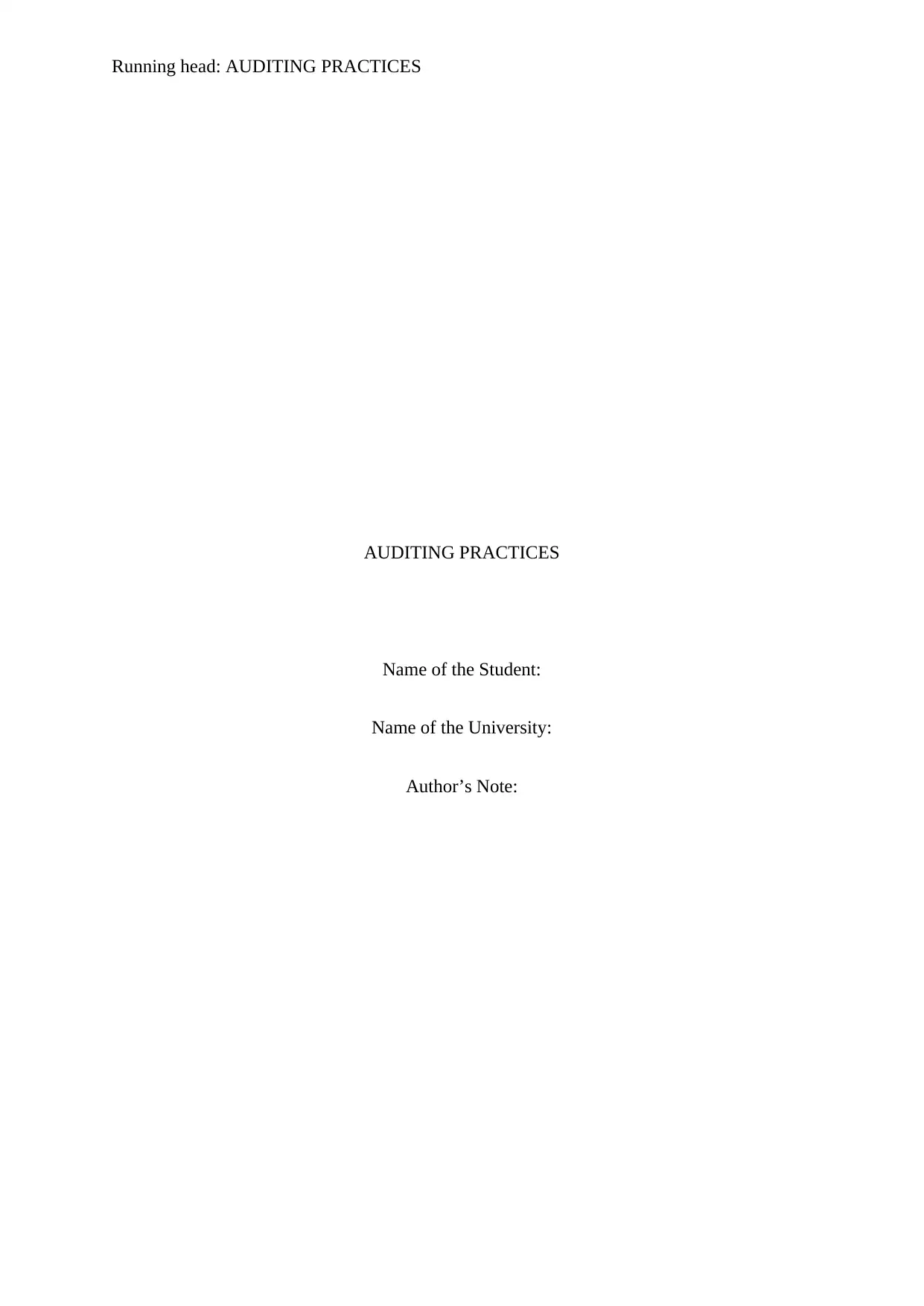
Running head: AUDITING PRACTICES
AUDITING PRACTICES
Name of the Student:
Name of the University:
Author’s Note:
AUDITING PRACTICES
Name of the Student:
Name of the University:
Author’s Note:
Paraphrase This Document
Need a fresh take? Get an instant paraphrase of this document with our AI Paraphraser
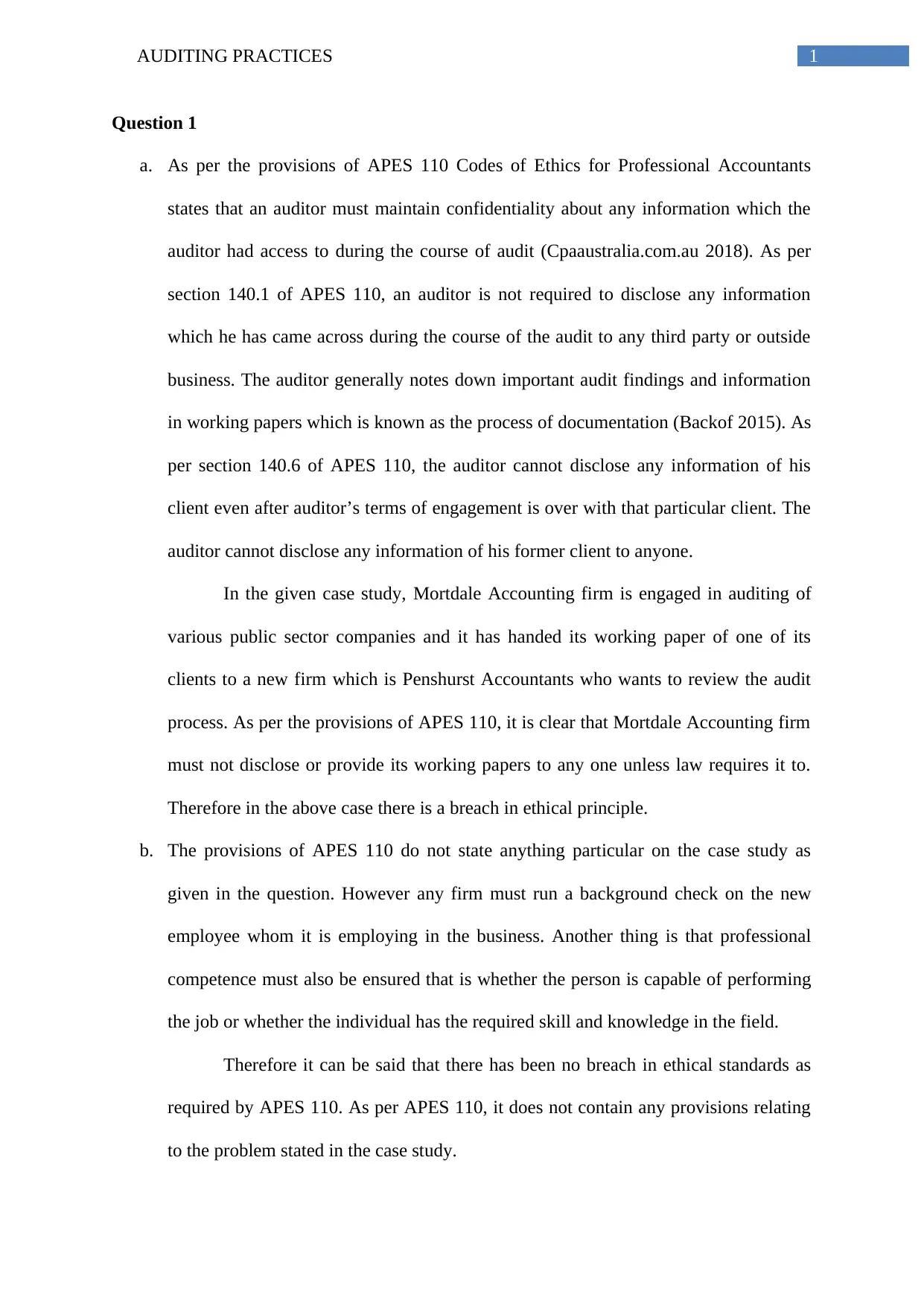
1AUDITING PRACTICES
Question 1
a. As per the provisions of APES 110 Codes of Ethics for Professional Accountants
states that an auditor must maintain confidentiality about any information which the
auditor had access to during the course of audit (Cpaaustralia.com.au 2018). As per
section 140.1 of APES 110, an auditor is not required to disclose any information
which he has came across during the course of the audit to any third party or outside
business. The auditor generally notes down important audit findings and information
in working papers which is known as the process of documentation (Backof 2015). As
per section 140.6 of APES 110, the auditor cannot disclose any information of his
client even after auditor’s terms of engagement is over with that particular client. The
auditor cannot disclose any information of his former client to anyone.
In the given case study, Mortdale Accounting firm is engaged in auditing of
various public sector companies and it has handed its working paper of one of its
clients to a new firm which is Penshurst Accountants who wants to review the audit
process. As per the provisions of APES 110, it is clear that Mortdale Accounting firm
must not disclose or provide its working papers to any one unless law requires it to.
Therefore in the above case there is a breach in ethical principle.
b. The provisions of APES 110 do not state anything particular on the case study as
given in the question. However any firm must run a background check on the new
employee whom it is employing in the business. Another thing is that professional
competence must also be ensured that is whether the person is capable of performing
the job or whether the individual has the required skill and knowledge in the field.
Therefore it can be said that there has been no breach in ethical standards as
required by APES 110. As per APES 110, it does not contain any provisions relating
to the problem stated in the case study.
Question 1
a. As per the provisions of APES 110 Codes of Ethics for Professional Accountants
states that an auditor must maintain confidentiality about any information which the
auditor had access to during the course of audit (Cpaaustralia.com.au 2018). As per
section 140.1 of APES 110, an auditor is not required to disclose any information
which he has came across during the course of the audit to any third party or outside
business. The auditor generally notes down important audit findings and information
in working papers which is known as the process of documentation (Backof 2015). As
per section 140.6 of APES 110, the auditor cannot disclose any information of his
client even after auditor’s terms of engagement is over with that particular client. The
auditor cannot disclose any information of his former client to anyone.
In the given case study, Mortdale Accounting firm is engaged in auditing of
various public sector companies and it has handed its working paper of one of its
clients to a new firm which is Penshurst Accountants who wants to review the audit
process. As per the provisions of APES 110, it is clear that Mortdale Accounting firm
must not disclose or provide its working papers to any one unless law requires it to.
Therefore in the above case there is a breach in ethical principle.
b. The provisions of APES 110 do not state anything particular on the case study as
given in the question. However any firm must run a background check on the new
employee whom it is employing in the business. Another thing is that professional
competence must also be ensured that is whether the person is capable of performing
the job or whether the individual has the required skill and knowledge in the field.
Therefore it can be said that there has been no breach in ethical standards as
required by APES 110. As per APES 110, it does not contain any provisions relating
to the problem stated in the case study.
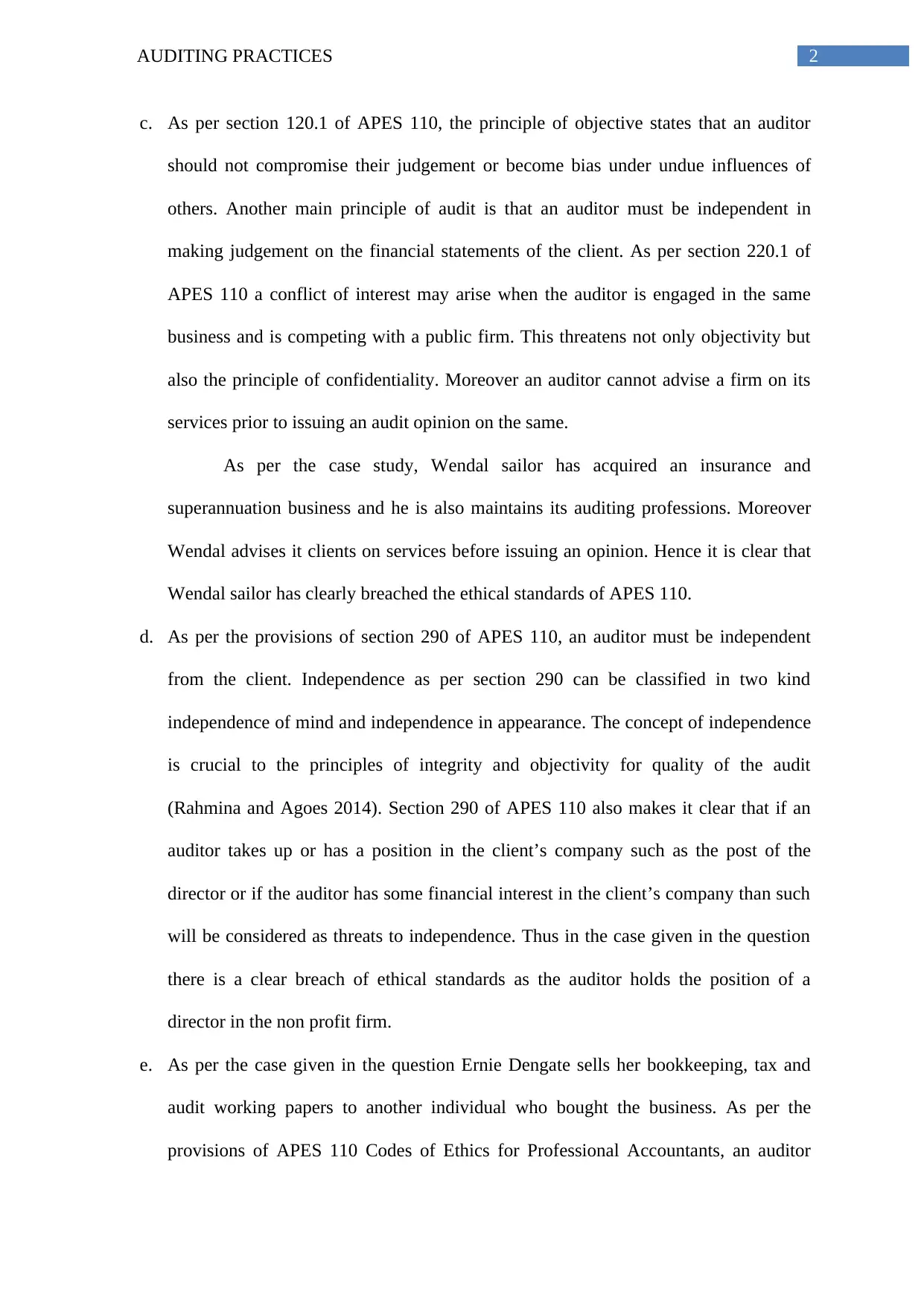
2AUDITING PRACTICES
c. As per section 120.1 of APES 110, the principle of objective states that an auditor
should not compromise their judgement or become bias under undue influences of
others. Another main principle of audit is that an auditor must be independent in
making judgement on the financial statements of the client. As per section 220.1 of
APES 110 a conflict of interest may arise when the auditor is engaged in the same
business and is competing with a public firm. This threatens not only objectivity but
also the principle of confidentiality. Moreover an auditor cannot advise a firm on its
services prior to issuing an audit opinion on the same.
As per the case study, Wendal sailor has acquired an insurance and
superannuation business and he is also maintains its auditing professions. Moreover
Wendal advises it clients on services before issuing an opinion. Hence it is clear that
Wendal sailor has clearly breached the ethical standards of APES 110.
d. As per the provisions of section 290 of APES 110, an auditor must be independent
from the client. Independence as per section 290 can be classified in two kind
independence of mind and independence in appearance. The concept of independence
is crucial to the principles of integrity and objectivity for quality of the audit
(Rahmina and Agoes 2014). Section 290 of APES 110 also makes it clear that if an
auditor takes up or has a position in the client’s company such as the post of the
director or if the auditor has some financial interest in the client’s company than such
will be considered as threats to independence. Thus in the case given in the question
there is a clear breach of ethical standards as the auditor holds the position of a
director in the non profit firm.
e. As per the case given in the question Ernie Dengate sells her bookkeeping, tax and
audit working papers to another individual who bought the business. As per the
provisions of APES 110 Codes of Ethics for Professional Accountants, an auditor
c. As per section 120.1 of APES 110, the principle of objective states that an auditor
should not compromise their judgement or become bias under undue influences of
others. Another main principle of audit is that an auditor must be independent in
making judgement on the financial statements of the client. As per section 220.1 of
APES 110 a conflict of interest may arise when the auditor is engaged in the same
business and is competing with a public firm. This threatens not only objectivity but
also the principle of confidentiality. Moreover an auditor cannot advise a firm on its
services prior to issuing an audit opinion on the same.
As per the case study, Wendal sailor has acquired an insurance and
superannuation business and he is also maintains its auditing professions. Moreover
Wendal advises it clients on services before issuing an opinion. Hence it is clear that
Wendal sailor has clearly breached the ethical standards of APES 110.
d. As per the provisions of section 290 of APES 110, an auditor must be independent
from the client. Independence as per section 290 can be classified in two kind
independence of mind and independence in appearance. The concept of independence
is crucial to the principles of integrity and objectivity for quality of the audit
(Rahmina and Agoes 2014). Section 290 of APES 110 also makes it clear that if an
auditor takes up or has a position in the client’s company such as the post of the
director or if the auditor has some financial interest in the client’s company than such
will be considered as threats to independence. Thus in the case given in the question
there is a clear breach of ethical standards as the auditor holds the position of a
director in the non profit firm.
e. As per the case given in the question Ernie Dengate sells her bookkeeping, tax and
audit working papers to another individual who bought the business. As per the
provisions of APES 110 Codes of Ethics for Professional Accountants, an auditor
⊘ This is a preview!⊘
Do you want full access?
Subscribe today to unlock all pages.

Trusted by 1+ million students worldwide
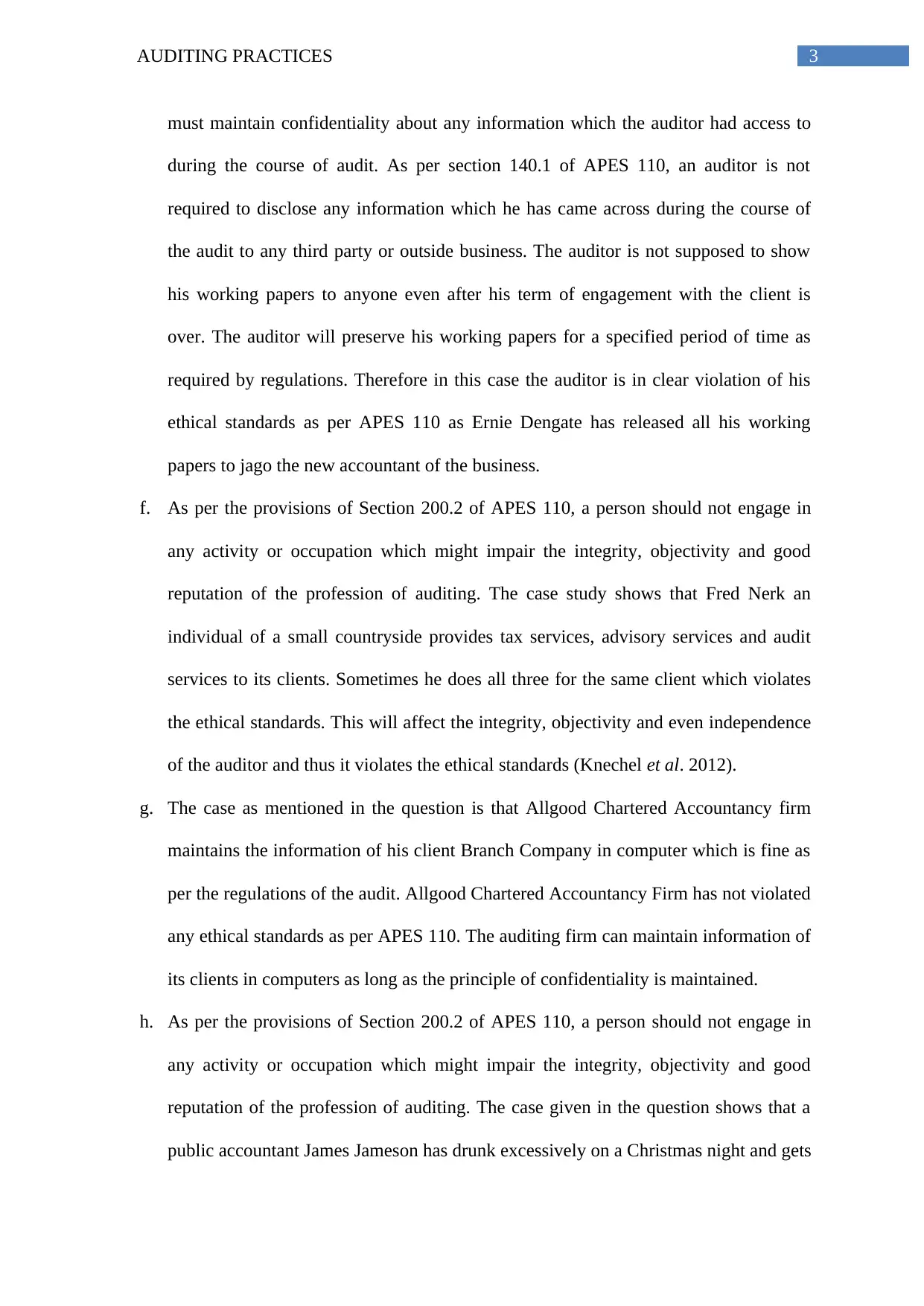
3AUDITING PRACTICES
must maintain confidentiality about any information which the auditor had access to
during the course of audit. As per section 140.1 of APES 110, an auditor is not
required to disclose any information which he has came across during the course of
the audit to any third party or outside business. The auditor is not supposed to show
his working papers to anyone even after his term of engagement with the client is
over. The auditor will preserve his working papers for a specified period of time as
required by regulations. Therefore in this case the auditor is in clear violation of his
ethical standards as per APES 110 as Ernie Dengate has released all his working
papers to jago the new accountant of the business.
f. As per the provisions of Section 200.2 of APES 110, a person should not engage in
any activity or occupation which might impair the integrity, objectivity and good
reputation of the profession of auditing. The case study shows that Fred Nerk an
individual of a small countryside provides tax services, advisory services and audit
services to its clients. Sometimes he does all three for the same client which violates
the ethical standards. This will affect the integrity, objectivity and even independence
of the auditor and thus it violates the ethical standards (Knechel et al. 2012).
g. The case as mentioned in the question is that Allgood Chartered Accountancy firm
maintains the information of his client Branch Company in computer which is fine as
per the regulations of the audit. Allgood Chartered Accountancy Firm has not violated
any ethical standards as per APES 110. The auditing firm can maintain information of
its clients in computers as long as the principle of confidentiality is maintained.
h. As per the provisions of Section 200.2 of APES 110, a person should not engage in
any activity or occupation which might impair the integrity, objectivity and good
reputation of the profession of auditing. The case given in the question shows that a
public accountant James Jameson has drunk excessively on a Christmas night and gets
must maintain confidentiality about any information which the auditor had access to
during the course of audit. As per section 140.1 of APES 110, an auditor is not
required to disclose any information which he has came across during the course of
the audit to any third party or outside business. The auditor is not supposed to show
his working papers to anyone even after his term of engagement with the client is
over. The auditor will preserve his working papers for a specified period of time as
required by regulations. Therefore in this case the auditor is in clear violation of his
ethical standards as per APES 110 as Ernie Dengate has released all his working
papers to jago the new accountant of the business.
f. As per the provisions of Section 200.2 of APES 110, a person should not engage in
any activity or occupation which might impair the integrity, objectivity and good
reputation of the profession of auditing. The case study shows that Fred Nerk an
individual of a small countryside provides tax services, advisory services and audit
services to its clients. Sometimes he does all three for the same client which violates
the ethical standards. This will affect the integrity, objectivity and even independence
of the auditor and thus it violates the ethical standards (Knechel et al. 2012).
g. The case as mentioned in the question is that Allgood Chartered Accountancy firm
maintains the information of his client Branch Company in computer which is fine as
per the regulations of the audit. Allgood Chartered Accountancy Firm has not violated
any ethical standards as per APES 110. The auditing firm can maintain information of
its clients in computers as long as the principle of confidentiality is maintained.
h. As per the provisions of Section 200.2 of APES 110, a person should not engage in
any activity or occupation which might impair the integrity, objectivity and good
reputation of the profession of auditing. The case given in the question shows that a
public accountant James Jameson has drunk excessively on a Christmas night and gets
Paraphrase This Document
Need a fresh take? Get an instant paraphrase of this document with our AI Paraphraser
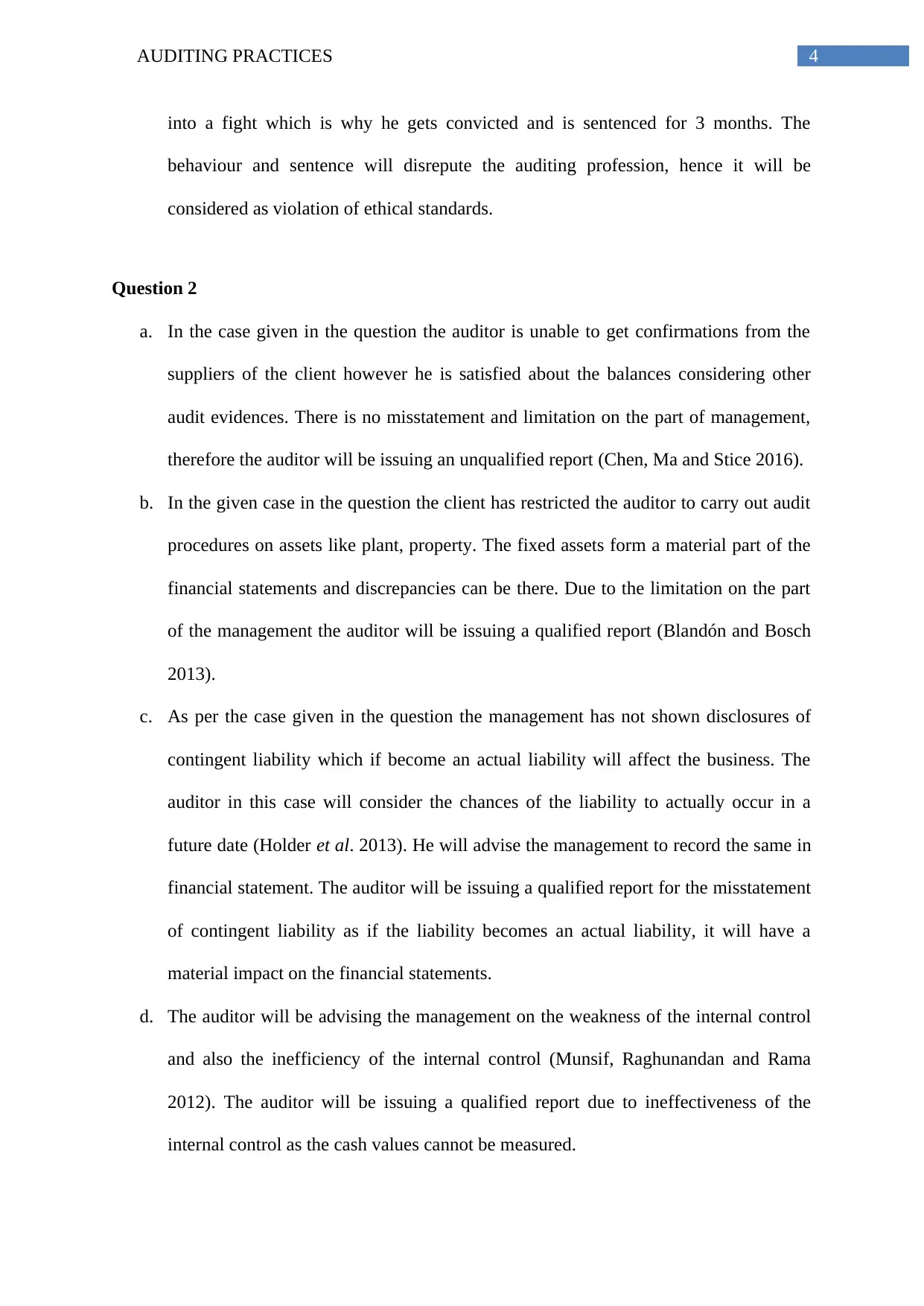
4AUDITING PRACTICES
into a fight which is why he gets convicted and is sentenced for 3 months. The
behaviour and sentence will disrepute the auditing profession, hence it will be
considered as violation of ethical standards.
Question 2
a. In the case given in the question the auditor is unable to get confirmations from the
suppliers of the client however he is satisfied about the balances considering other
audit evidences. There is no misstatement and limitation on the part of management,
therefore the auditor will be issuing an unqualified report (Chen, Ma and Stice 2016).
b. In the given case in the question the client has restricted the auditor to carry out audit
procedures on assets like plant, property. The fixed assets form a material part of the
financial statements and discrepancies can be there. Due to the limitation on the part
of the management the auditor will be issuing a qualified report (Blandón and Bosch
2013).
c. As per the case given in the question the management has not shown disclosures of
contingent liability which if become an actual liability will affect the business. The
auditor in this case will consider the chances of the liability to actually occur in a
future date (Holder et al. 2013). He will advise the management to record the same in
financial statement. The auditor will be issuing a qualified report for the misstatement
of contingent liability as if the liability becomes an actual liability, it will have a
material impact on the financial statements.
d. The auditor will be advising the management on the weakness of the internal control
and also the inefficiency of the internal control (Munsif, Raghunandan and Rama
2012). The auditor will be issuing a qualified report due to ineffectiveness of the
internal control as the cash values cannot be measured.
into a fight which is why he gets convicted and is sentenced for 3 months. The
behaviour and sentence will disrepute the auditing profession, hence it will be
considered as violation of ethical standards.
Question 2
a. In the case given in the question the auditor is unable to get confirmations from the
suppliers of the client however he is satisfied about the balances considering other
audit evidences. There is no misstatement and limitation on the part of management,
therefore the auditor will be issuing an unqualified report (Chen, Ma and Stice 2016).
b. In the given case in the question the client has restricted the auditor to carry out audit
procedures on assets like plant, property. The fixed assets form a material part of the
financial statements and discrepancies can be there. Due to the limitation on the part
of the management the auditor will be issuing a qualified report (Blandón and Bosch
2013).
c. As per the case given in the question the management has not shown disclosures of
contingent liability which if become an actual liability will affect the business. The
auditor in this case will consider the chances of the liability to actually occur in a
future date (Holder et al. 2013). He will advise the management to record the same in
financial statement. The auditor will be issuing a qualified report for the misstatement
of contingent liability as if the liability becomes an actual liability, it will have a
material impact on the financial statements.
d. The auditor will be advising the management on the weakness of the internal control
and also the inefficiency of the internal control (Munsif, Raghunandan and Rama
2012). The auditor will be issuing a qualified report due to ineffectiveness of the
internal control as the cash values cannot be measured.
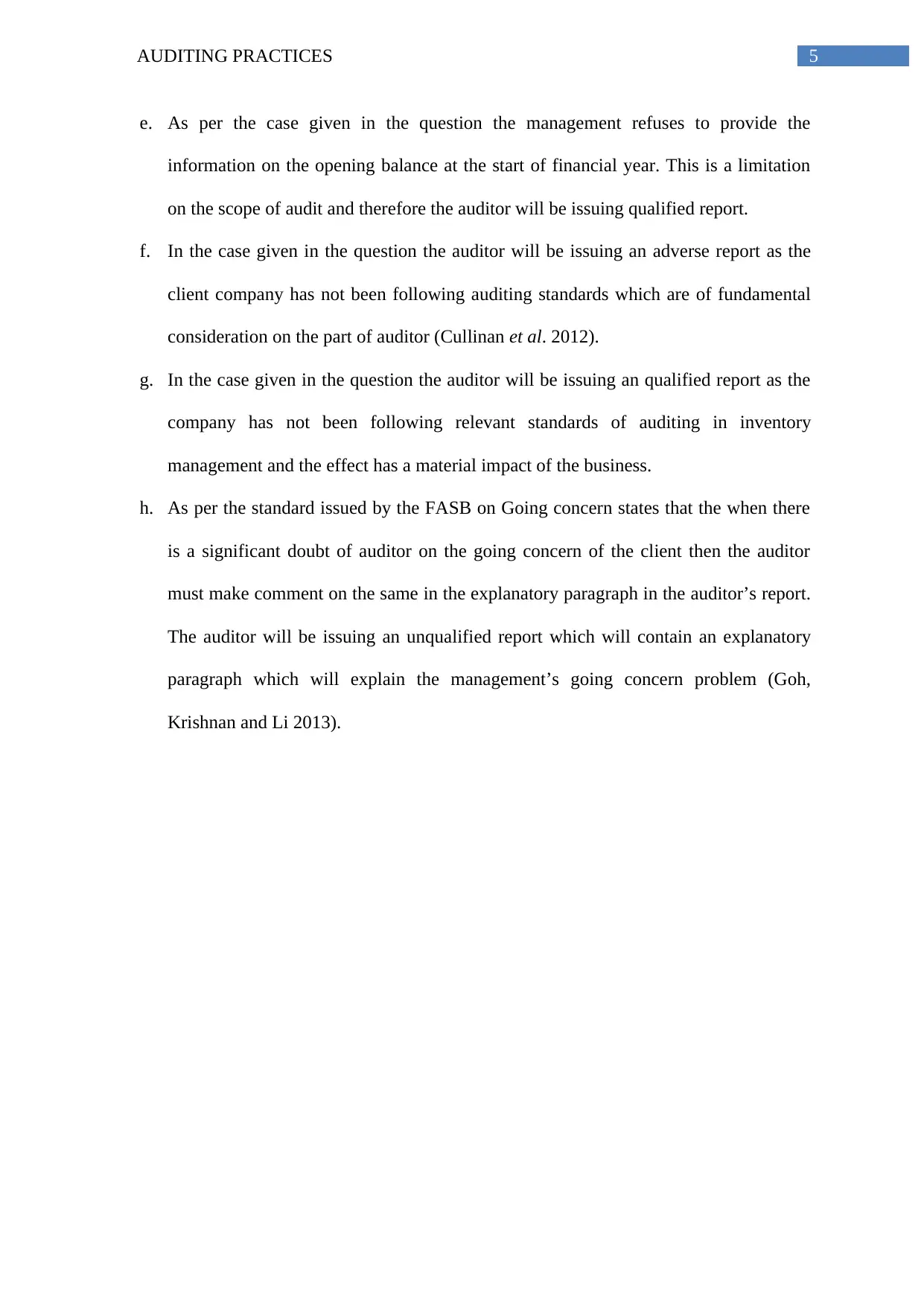
5AUDITING PRACTICES
e. As per the case given in the question the management refuses to provide the
information on the opening balance at the start of financial year. This is a limitation
on the scope of audit and therefore the auditor will be issuing qualified report.
f. In the case given in the question the auditor will be issuing an adverse report as the
client company has not been following auditing standards which are of fundamental
consideration on the part of auditor (Cullinan et al. 2012).
g. In the case given in the question the auditor will be issuing an qualified report as the
company has not been following relevant standards of auditing in inventory
management and the effect has a material impact of the business.
h. As per the standard issued by the FASB on Going concern states that the when there
is a significant doubt of auditor on the going concern of the client then the auditor
must make comment on the same in the explanatory paragraph in the auditor’s report.
The auditor will be issuing an unqualified report which will contain an explanatory
paragraph which will explain the management’s going concern problem (Goh,
Krishnan and Li 2013).
e. As per the case given in the question the management refuses to provide the
information on the opening balance at the start of financial year. This is a limitation
on the scope of audit and therefore the auditor will be issuing qualified report.
f. In the case given in the question the auditor will be issuing an adverse report as the
client company has not been following auditing standards which are of fundamental
consideration on the part of auditor (Cullinan et al. 2012).
g. In the case given in the question the auditor will be issuing an qualified report as the
company has not been following relevant standards of auditing in inventory
management and the effect has a material impact of the business.
h. As per the standard issued by the FASB on Going concern states that the when there
is a significant doubt of auditor on the going concern of the client then the auditor
must make comment on the same in the explanatory paragraph in the auditor’s report.
The auditor will be issuing an unqualified report which will contain an explanatory
paragraph which will explain the management’s going concern problem (Goh,
Krishnan and Li 2013).
⊘ This is a preview!⊘
Do you want full access?
Subscribe today to unlock all pages.

Trusted by 1+ million students worldwide
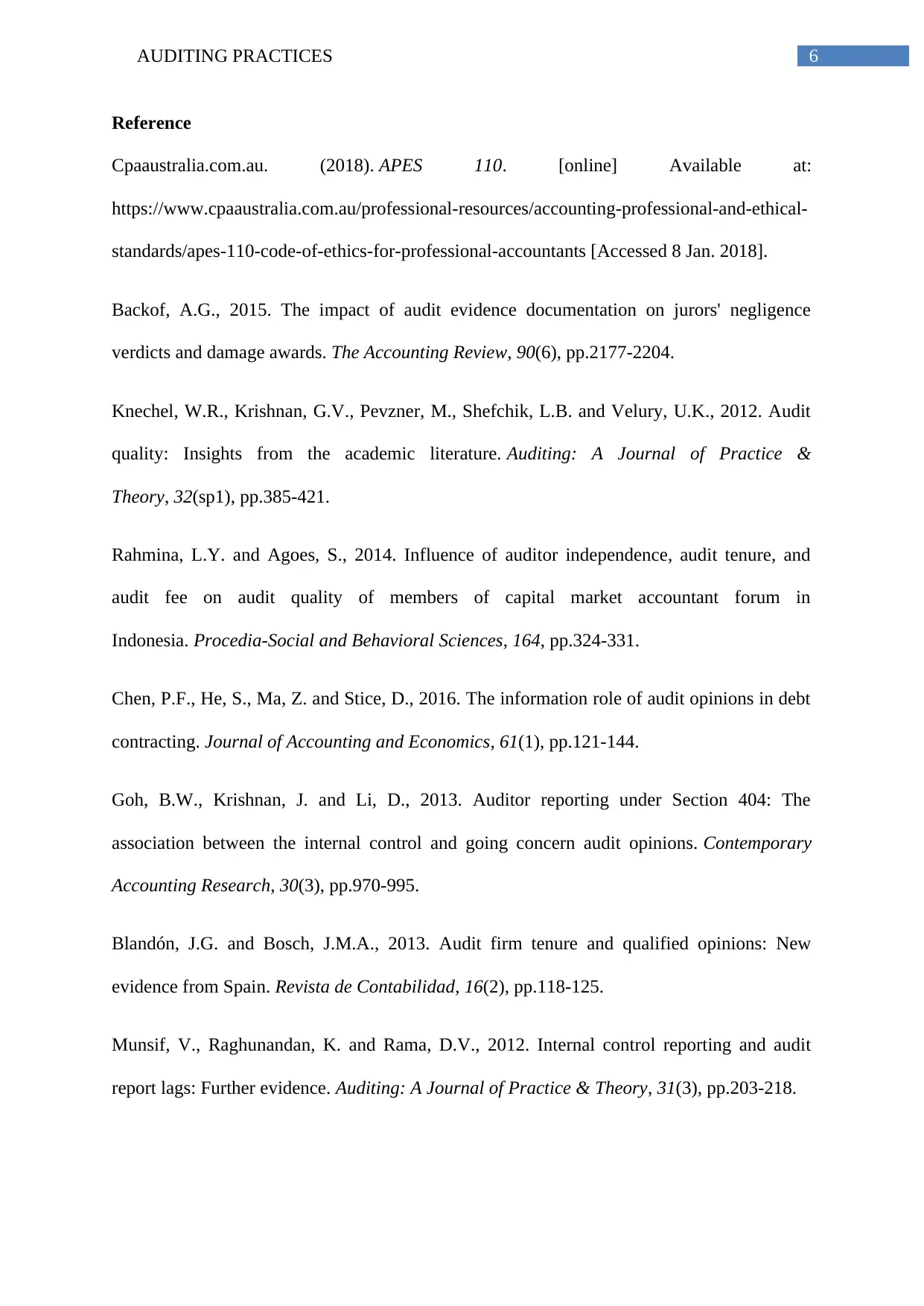
6AUDITING PRACTICES
Reference
Cpaaustralia.com.au. (2018). APES 110. [online] Available at:
https://www.cpaaustralia.com.au/professional-resources/accounting-professional-and-ethical-
standards/apes-110-code-of-ethics-for-professional-accountants [Accessed 8 Jan. 2018].
Backof, A.G., 2015. The impact of audit evidence documentation on jurors' negligence
verdicts and damage awards. The Accounting Review, 90(6), pp.2177-2204.
Knechel, W.R., Krishnan, G.V., Pevzner, M., Shefchik, L.B. and Velury, U.K., 2012. Audit
quality: Insights from the academic literature. Auditing: A Journal of Practice &
Theory, 32(sp1), pp.385-421.
Rahmina, L.Y. and Agoes, S., 2014. Influence of auditor independence, audit tenure, and
audit fee on audit quality of members of capital market accountant forum in
Indonesia. Procedia-Social and Behavioral Sciences, 164, pp.324-331.
Chen, P.F., He, S., Ma, Z. and Stice, D., 2016. The information role of audit opinions in debt
contracting. Journal of Accounting and Economics, 61(1), pp.121-144.
Goh, B.W., Krishnan, J. and Li, D., 2013. Auditor reporting under Section 404: The
association between the internal control and going concern audit opinions. Contemporary
Accounting Research, 30(3), pp.970-995.
Blandón, J.G. and Bosch, J.M.A., 2013. Audit firm tenure and qualified opinions: New
evidence from Spain. Revista de Contabilidad, 16(2), pp.118-125.
Munsif, V., Raghunandan, K. and Rama, D.V., 2012. Internal control reporting and audit
report lags: Further evidence. Auditing: A Journal of Practice & Theory, 31(3), pp.203-218.
Reference
Cpaaustralia.com.au. (2018). APES 110. [online] Available at:
https://www.cpaaustralia.com.au/professional-resources/accounting-professional-and-ethical-
standards/apes-110-code-of-ethics-for-professional-accountants [Accessed 8 Jan. 2018].
Backof, A.G., 2015. The impact of audit evidence documentation on jurors' negligence
verdicts and damage awards. The Accounting Review, 90(6), pp.2177-2204.
Knechel, W.R., Krishnan, G.V., Pevzner, M., Shefchik, L.B. and Velury, U.K., 2012. Audit
quality: Insights from the academic literature. Auditing: A Journal of Practice &
Theory, 32(sp1), pp.385-421.
Rahmina, L.Y. and Agoes, S., 2014. Influence of auditor independence, audit tenure, and
audit fee on audit quality of members of capital market accountant forum in
Indonesia. Procedia-Social and Behavioral Sciences, 164, pp.324-331.
Chen, P.F., He, S., Ma, Z. and Stice, D., 2016. The information role of audit opinions in debt
contracting. Journal of Accounting and Economics, 61(1), pp.121-144.
Goh, B.W., Krishnan, J. and Li, D., 2013. Auditor reporting under Section 404: The
association between the internal control and going concern audit opinions. Contemporary
Accounting Research, 30(3), pp.970-995.
Blandón, J.G. and Bosch, J.M.A., 2013. Audit firm tenure and qualified opinions: New
evidence from Spain. Revista de Contabilidad, 16(2), pp.118-125.
Munsif, V., Raghunandan, K. and Rama, D.V., 2012. Internal control reporting and audit
report lags: Further evidence. Auditing: A Journal of Practice & Theory, 31(3), pp.203-218.
Paraphrase This Document
Need a fresh take? Get an instant paraphrase of this document with our AI Paraphraser
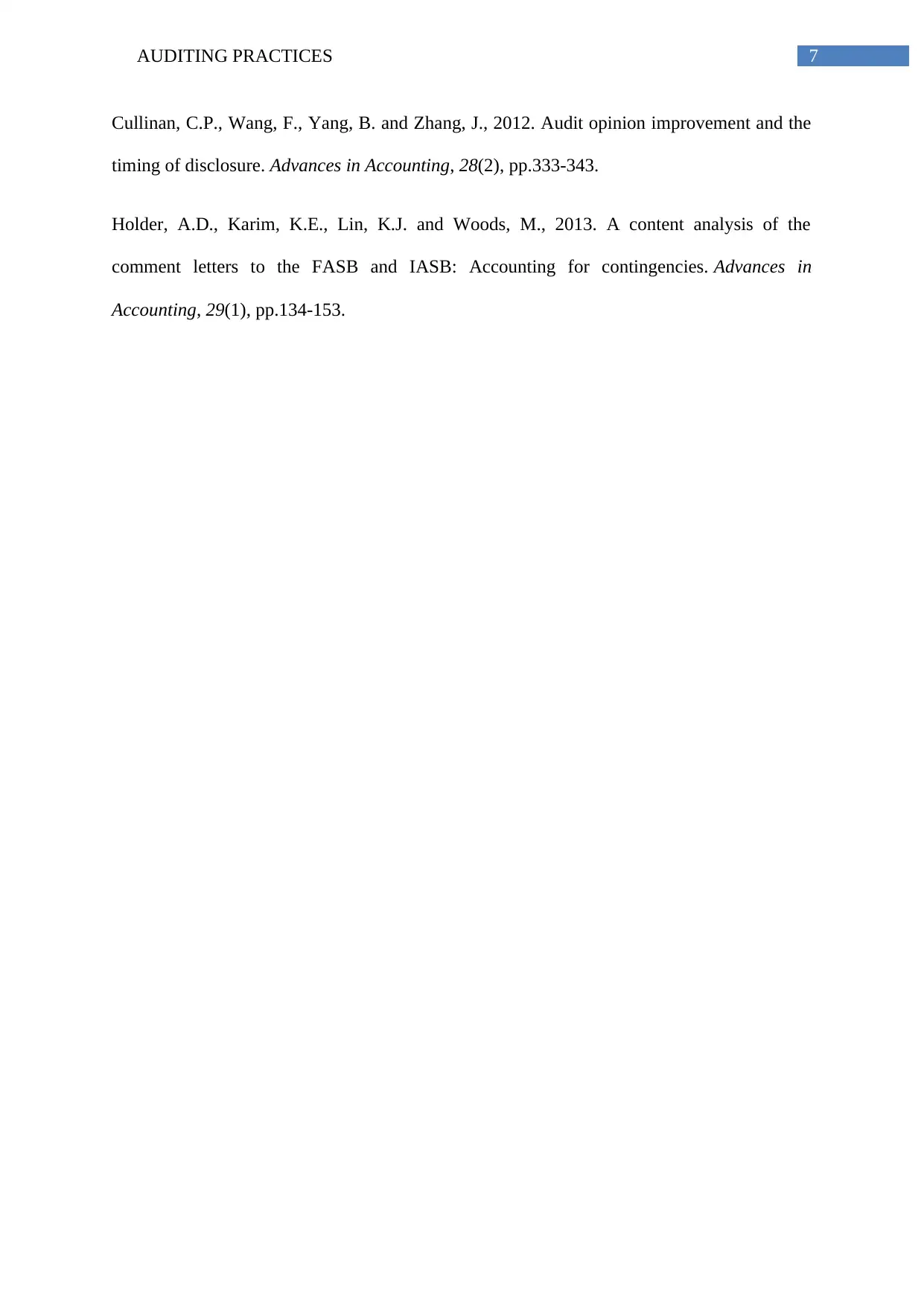
7AUDITING PRACTICES
Cullinan, C.P., Wang, F., Yang, B. and Zhang, J., 2012. Audit opinion improvement and the
timing of disclosure. Advances in Accounting, 28(2), pp.333-343.
Holder, A.D., Karim, K.E., Lin, K.J. and Woods, M., 2013. A content analysis of the
comment letters to the FASB and IASB: Accounting for contingencies. Advances in
Accounting, 29(1), pp.134-153.
Cullinan, C.P., Wang, F., Yang, B. and Zhang, J., 2012. Audit opinion improvement and the
timing of disclosure. Advances in Accounting, 28(2), pp.333-343.
Holder, A.D., Karim, K.E., Lin, K.J. and Woods, M., 2013. A content analysis of the
comment letters to the FASB and IASB: Accounting for contingencies. Advances in
Accounting, 29(1), pp.134-153.
1 out of 8
Related Documents
Your All-in-One AI-Powered Toolkit for Academic Success.
+13062052269
info@desklib.com
Available 24*7 on WhatsApp / Email
![[object Object]](/_next/static/media/star-bottom.7253800d.svg)
Unlock your academic potential
Copyright © 2020–2026 A2Z Services. All Rights Reserved. Developed and managed by ZUCOL.




